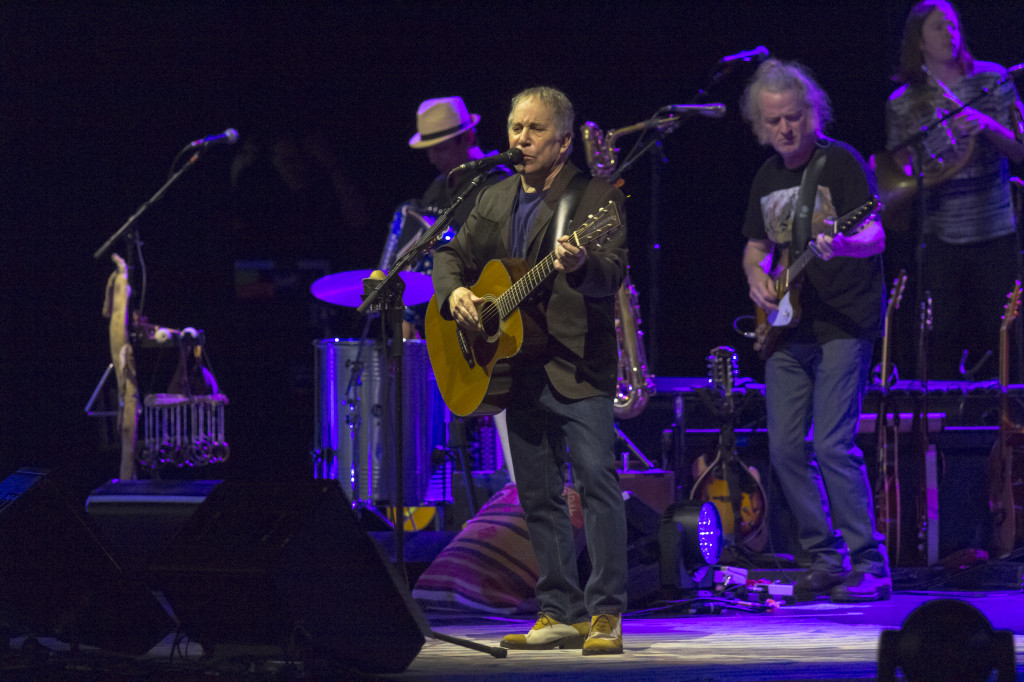
It was about the middle of Paul Simon’s set at the Wolf Trap Tuesday when the news alert came across phones — Simon told the New York Times he was ready to quit music altogether, making these final set of concerts, which close out this weekend at Forest Hills, in Queens, his last U.S. dates. (He still has a fall European tour to do).
That only made the sprightly show in the Northern Virginia woods one to cherish more. By now, Simon combines the most crowd pleasing of his era dabbling with world music with nuggets from his earlier solo career, and even a couple from the duo that preceded it all. At the same time, he’s got some pretty smart new material which you can’t say he’s exactly shoving down anyone’s throat — he only played three songs from the current “Stranger to Stranger.”
At 74, his voice is remarkable — clear and evocative that’s able to replicate the notes from decades ago, though he declined mostly to do that. Not because he wouldn’t reach notes, but because he enjoys still playing around with the music, stretching a line, giving it a bluesy turn or otherwise keeping the show from being a nostalgic singalong, which he could have very easily done.
Indeed, ripples of applause greeted the enduring melody of the Incan pipes of “El Condor Pasa” but it was just played as an instrumental, leading into the slightly more obscure but even more welcome “Duncan,” which has its own, just as lovely counter melody (using those same pipes).
The show itself began with the percussive blast of “Proof,” but once more proved just to be an instrumental introduction for Simon’s entrance, who when he took the stage began “The Boy in the Bubble.”
Simon obviously enjoys the power and versatility of his nine musicians and so let them play a third instrumental, a cover of Bill Doggett’s “Honky Tonk” to lead to “Slip Sliding’ Away,” one of a dozen or so hits from the 70s his fans could celebrate including “Mother and Child Reunion” and “Me and Julio Down by the Schoolyard” that immediately followed, and “50 Ways to Leave Your Lover” early in the set. The “Graceland” double shot of “Diamonds on the Soles of her Shoes” and “You Can Call Me Al” closed the main set, and “Still Crazy After All These Years” and “Late in the Evening” emerged in the encores.
The Doggett tune wasn’t the only homage to early rock, as the Tuesday show was the first in which he tried out a cover of “That’s All Right” that he was planning for his Queens shows.
That too seemed unexpectedly timely — Scotty Moore, Elvis Presley’s influential guitarist, died that day at 84. Still, the Times story says he had tried it out during sound check Monday, so it was more of a dark coincidence.
So, too, was a big summer storm that blew through the show, soaking the lawn and sprinkling the covered seats. So much so that the crowd reacted when he sang, “a good day ain’t got no rain” in “Slip Slidin’ Away.”
As literary as Simon’s songbook is — he can reel out poetic and perfectly-placed lines seemingly effortlessly — he is still quite inventive musically, using more interesting time signatures than anyone in popular music since Brubeck, playing a 9/8 on “The Cool, Cool Water.”
Simon may not have made a declaration on stage about any decision to quit, but he seemed to especially appreciate both the playing of his music and basked in the reaction.
He saved a couple of great ones for the encores, with acoustic readings of “The Boxer” and, in the end, “The Sound of Silence,” replacing a one night switch to “An American Tune” the night before. By then, he could no longer stop those who wanted to sing along, and so he gave up the “Li-li-li” chorus to them on “The Boxer,” for one of the last times.